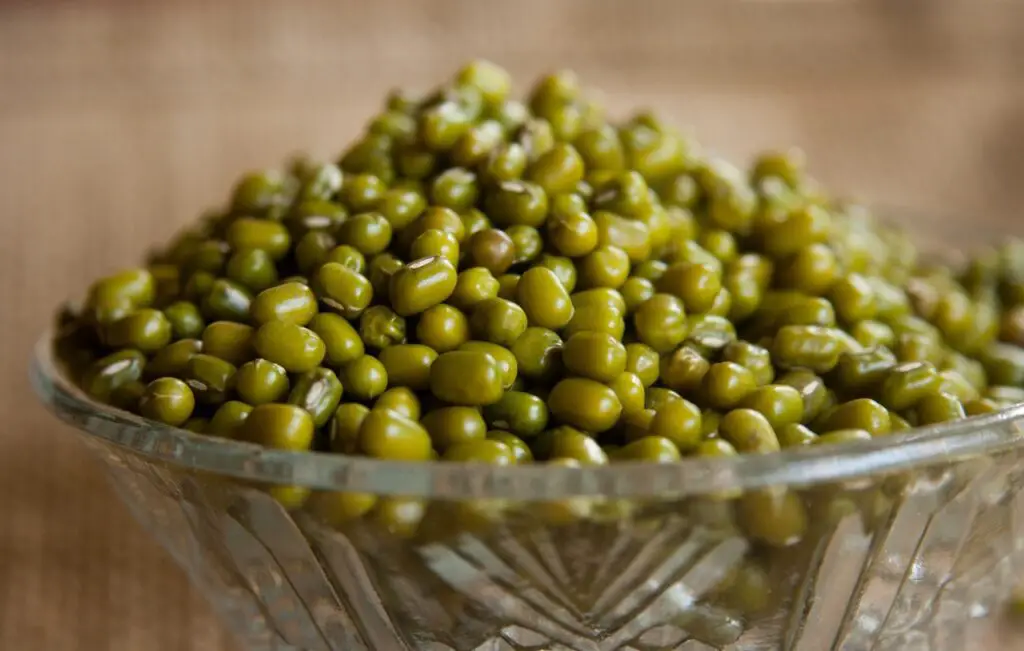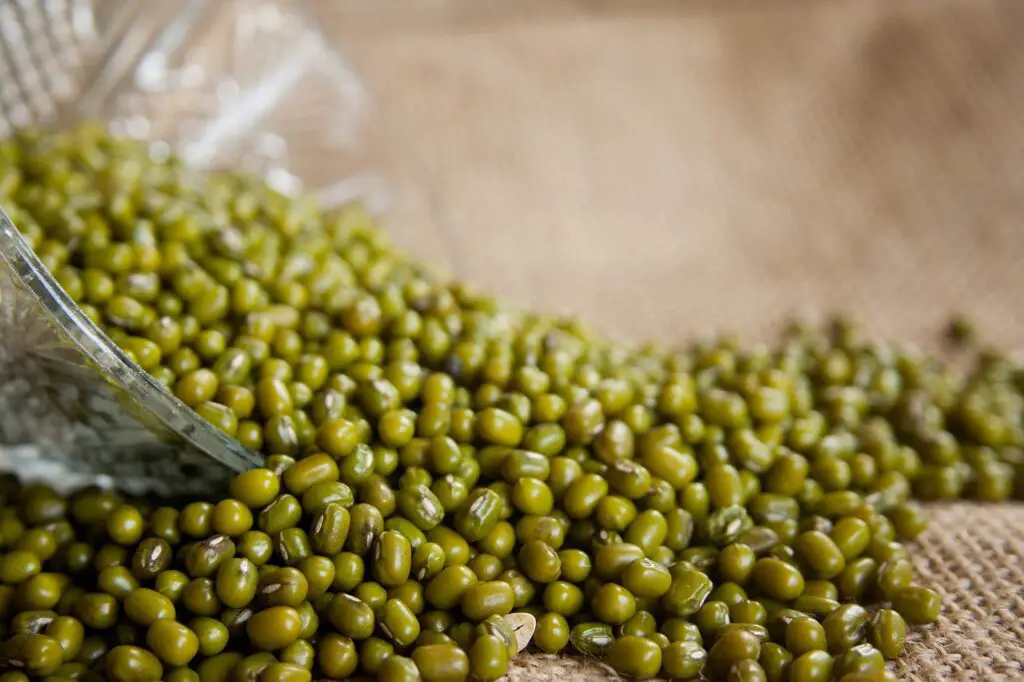As pet owners, we always want the best for our furry friends, from their food to their overall well-being.
With the rise in popularity of plant-based diets and superfoods, it’s not uncommon to wonder if our canine companions can also benefit from these food trends.
One particular food that has been gaining attention lately is mung beans. You may have heard of the health benefits for humans who consume mung beans, but what about dogs?
Can dogs eat mung beans?
In this article, we’ll dive into the nutritional value of mung beans, the potential health benefits for dogs, as well as any risks or concerns associated with feeding mung beans to your furry friend.
- Can Dogs Eat Mung Beans?
- How Many Mung Beans Can Dogs Eat?
- How Often Can Dogs Eat Mung Beans
- Health Benefits of Mung Beans To Dogs
- Potential Risks of Feeding Mung Beans To Dogs
- Nutritional Benefits of Mung Beans For Dogs
- Are Dogs Sensitive To Mung Beans?
- How To Prepare Mung Beans For Dogs
- How Fast Will Dogs Digest Mung Beans?
- In Conclusion
Can Dogs Eat Mung Beans?

Yes, dogs can safely eat sprouted (raw) and cooked mung beans. In fact, mung beans are packed with nutrients that can benefit your furry companion’s health.
These tiny green legumes are high in fiber, protein, vitamins, and minerals like folate, magnesium, and potassium.
Mung beans are also low in fat and calories, making them a great option for dogs who need to lose weight or maintain a healthy weight.
However, it’s important to prepare and serve mung beans properly to avoid any potential digestive issues or other health concerns.
Let’s take a closer look at the benefits and risks of feeding mung beans to your canine companion.
See also: 47 Safe Vegetables To Feed Your Dog. Puppy Power!
How Many Mung Beans Can Dogs Eat?

The number of mung beans a dog can eat depends on several factors, such as their size, weight, and overall health condition.
Generally, it’s best to introduce mung beans gradually into your dog’s diet and in small portions, observing their reaction and tolerance.
A good rule of thumb is to give your dog no more than 10% of their daily food intake in the form of mung beans.
For example, if your dog eats one cup of food a day, limit their mung bean consumption to 1-2 tablespoons per day.
It’s also essential to note that too many mung beans can cause digestive issues, such as bloating or diarrhea, so it’s crucial to monitor their intake carefully.
If you have any concerns or questions about feeding mung beans to your dog, be sure to consult with your veterinarian.
Mung Beans Feeding Chart According To Size
| Food | Size | Portion |
|---|---|---|
| Mung Beans | Toy dogs | 1 tbsp |
| Mung Beans | Small dogs | 1 tbsp |
| Mung Beans | Medium dogs | 2 tbsps |
| Mung Beans | Large Dogs | 2 tbsps |
Mung Beans Feeding Chart According To Age
| Food | Age | Portion |
|---|---|---|
| Mung Beans | 0 – 6 months | Don’t feed |
| Mung Beans | 6 – 12 months | 1 tbsp |
| Mung Beans | 12 – 24 months | 2 tbsps |
| Mung Beans | 24+ months | 2 tbsps |
How Often Can Dogs Eat Mung Beans
Mung beans can be a nourishing addition to your dog’s diet, but it’s important not to overdo it. Dogs can eat mung beans once or twice a week, as part of a varied and balanced diet.
It’s best to avoid feeding mung beans to dogs too frequently, as a sudden increase in fiber intake can cause digestive issues such as diarrhea or stomach upset.
Always monitor your pet’s reaction to a new food, including mung beans, and speak to your veterinarian to determine the appropriate frequency of feeding.
Additionally, remember to adjust your dog’s caloric intake based on their age, breed, and activity level, taking into account any dietary restrictions or health issues that may be present.
Health Benefits of Mung Beans To Dogs
- Rich in Nutrients. Mung beans are packed with essential nutrients that can benefit your dog’s overall health. They are loaded with protein, fiber, vitamins, and minerals like folate, magnesium, and potassium. These nutrients help your dog maintain healthy bones, muscles, and organs.
- Weight Management. Mung beans are low in fat and calories, making them an excellent option for dogs who need to lose weight or maintain a healthy weight. The high fiber content in mung beans helps your dog feel full for longer, reducing the risk of overeating or snacking between meals.
- Digestive Health. The fiber in mung beans helps regulate bowel movements and promotes healthy digestion. This makes them a good choice for dogs with constipation, diarrhea, or other digestive issues. Additionally, the antioxidants in mung beans can help reduce inflammation in the gut.
- Boost the Immune System. Mung beans contain high levels of vitamins and minerals that can help boost your dog’s immune system. These nutrients work to support your dog’s overall health and well-being, helping prevent illnesses and infections.
- Anti-Inflammatory Properties. Mung beans contain compounds that have anti-inflammatory properties that can help reduce inflammation throughout the body. This makes them a useful food for dogs with conditions that cause inflammation, such as arthritis or allergies. Incorporating mung beans into your dog’s diet can help manage these conditions and reduce symptoms.
Potential Risks of Feeding Mung Beans To Dogs
- Digestive Issues. Mung beans contain complex carbohydrates that can be difficult for some dogs to digest. Feeding too many mung beans or introducing them too quickly into your dog’s diet can lead to bloating, gas, and diarrhea. It’s essential to start with a small amount of mung beans and monitor your dog’s reaction before incorporating them into your dog’s diet.
- Allergies. Some dogs may be allergic to mung beans, which can result in an allergic reaction. Symptoms of an allergic reaction can include swelling, itching, redness, and vomiting. If you notice any of these symptoms, stop feeding your dog mung beans immediately and contact your veterinarian.
- Pesticide Residue. Like all legumes, mung beans are sometimes treated with pesticides during the growing process. Pesticide residue can be harmful to dogs and other pets. It’s important to buy organic mung beans whenever possible to avoid exposure to harmful chemicals.
- Nutrient Imbalance. Dogs require a balanced and complete diet to maintain good health. Feeding too many mung beans to your dog can cause an imbalance in their nutrient intake, leading to health issues over time. It’s important to incorporate mung beans into your dog’s diet in moderation and only as part of a balanced meal plan.
Nutritional Benefits of Mung Beans For Dogs
| Mung Beans Nutrition Facts per 100 grams | % DV * |
|---|---|
| Calories | 347 |
| Total Fat | 1.2 g |
| Cholesterol | 0 mg |
| Sugar | 7 g |
| Glycemic Index | 25 |
| Sodium | 15 mg |
| Carbs | 63 g |
| Protein | 24 g |
| Vitamin C | 8% |
| Calcium | 13% |
| Iron | 37% |
| Potassium | 1,246 mg |
Are Dogs Sensitive To Mung Beans?
Yes, some dogs can be sensitive to mung beans. While mung beans are generally safe for dogs to consume, some dogs may experience an allergic reaction or sensitivity to the legumes.
Symptoms of sensitivity or allergic reaction can vary in severity but can include vomiting, diarrhea, itching, hives, redness, and swelling around the face, mouth, or neck.
If your dog is experiencing any of these symptoms after consuming mung beans, it’s essential to stop feeding them the legumes and consult with your veterinarian.
Your vet can help diagnose the cause of the reaction and provide appropriate treatment options to help your furry friend.
If your dog has never consumed mung beans before, it’s best to introduce them gradually and watch for any signs of sensitivity or adverse reaction.
How To Prepare Mung Beans For Dogs
Cooked and Mashed
One way to prepare mung beans for your dog is by cooking them until they are soft and then mashing them up. First, rinse the mung beans and soak them in water overnight. The next day, drain the water and rinse them again. Then, boil the mung beans for 30-40 minutes until they are soft. Let them cool and then mash them up and mix them into your dog’s regular meals.
Sprouted
Another way to prepare mung beans for your dog is by sprouting them. This is a simple process that involves soaking the mung beans and then rinsing them several times a day. After a few days, you will see sprouts beginning to appear. Once the sprouts are visible, they are ready for your dog to eat. Make sure to rinse them thoroughly before serving.
Mixed with Rice
Mung beans can also be mixed with rice to create a nutritious meal for your dog. Start by soaking and cooking the mung beans, as described above. Then, cook a small amount of rice separately, and mix the two together. You can add some cooked vegetables or small amounts of lean meat to the mixture for added nutrition. Serve the mixture in small portions as a meal for your dog.
How Fast Will Dogs Digest Mung Beans?
Dogs can digest mung beans relatively quickly, usually within a few hours of consuming them.
However, the exact amount of time it takes for mung beans to digest can depend on several factors, such as the dog’s size, age, dietary habits, and overall health.
Mung beans are high in fiber, which can help regulate digestive processes in dogs and prevent constipation, but it’s essential not to overfeed mung beans or introduce them too quickly into your dog’s diet, as this can lead to digestive issues like gas, bloating, or diarrhea.
It’s always a good idea to track your dog’s reactions to new foods, including mung beans, to ensure that they don’t cause any adverse effects on your furry friend’s health.
If you’re concerned about your dog’s digestion or have any questions about incorporating mung beans into your dog’s diet, consult with your veterinarian.
In Conclusion
In conclusion, mung beans can be a nutritious and healthy addition to your dog’s diet, as long as they are prepared and served appropriately.
Mung beans are a rich source of protein, fiber, vitamins, and minerals that can have many potential health benefits for your furry friend.
However, it’s essential to introduce mung beans gradually, monitor your dog’s reaction, and avoid overfeeding them as too many mung beans can lead to digestive issues.
Additionally, it’s important to buy organic mung beans whenever possible to avoid exposure to harmful pesticides.
If you have any concerns or questions about feeding mung beans to your dog or any other aspect of their diet or health, always consult with your veterinarian.





Leave a Reply